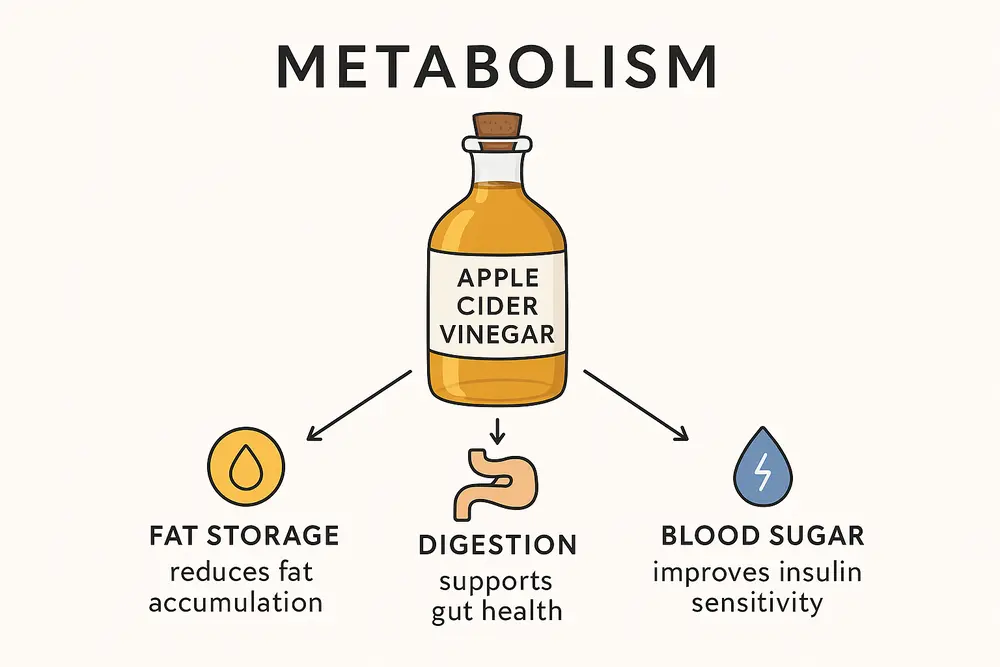Apple cider vinegar has taken the wellness world by storm—and it’s not just a passing fad. From celebrities to nutritionists, everyone seems to be raving about its benefits for weight loss, digestion, and detoxification. But does it actually work, or is it just another overhyped home remedy?
This article dives deep into everything you need to know about using apple cider vinegar for weight loss. You’ll learn how it works in the body, the science behind its fat-burning properties, how to drink it safely, and what kind of results real people have experienced. Whether you’re just curious or ready to add this powerful tonic to your daily routine, you’ll find practical, research-backed insights here.
Introduction to Apple Cider Vinegar and Weight Loss
What Is Apple Cider Vinegar?
Apple cider vinegar (ACV) is a fermented liquid made from crushed apples, yeast, and sugar. Over time, this mixture undergoes a double fermentation process, turning sugars into alcohol and then into acetic acid, which gives ACV its sharp taste and strong smell.
That acetic acid? It’s the key ingredient responsible for most of the health benefits attributed to apple cider vinegar—especially when it comes to weight loss, digestion, and blood sugar control. Many versions also contain “the mother,” a mix of good bacteria, enzymes, and proteins that form during fermentation.
While it’s long been used in cooking and natural medicine, apple cider vinegar’s popularity exploded when people began using it as a natural fat-burning remedy—and swearing by the results.
Why It’s Trending in Natural Weight Loss Remedies
So, why are so many people turning to apple cider vinegar as part of their weight loss strategy?
First, it’s affordable and accessible. You can find a bottle of organic ACV for under $10 at most grocery stores. Second, it fits perfectly into the clean-eating and natural-living lifestyle, making it an attractive option for those trying to avoid processed supplements and pills.
More importantly, studies have shown that apple cider vinegar may help reduce appetite, slow the digestion of carbohydrates, and improve blood sugar levels—all of which are crucial for effective fat loss. When taken correctly, ACV may even help you feel full faster, consume fewer calories, and ultimately lose weight without changing your entire lifestyle.
In short, it’s simple, it’s natural, and it’s backed by both science and centuries of traditional use. But as with any health trend, the real power lies in how you use it—and that’s exactly what we’re about to explore.
How Apple Cider Vinegar Works Inside Your Body
Effects on Metabolism, Digestion, and Fat Storage
When you consume apple cider vinegar, the primary compound doing the heavy lifting is acetic acid—a short-chain fatty acid that plays a major role in supporting metabolic health. Here’s what happens once it enters your system:
- Boosts Metabolism: Acetic acid has been shown to increase the expression of genes that help break down fat. In simpler terms, it helps your body burn more fat by signaling your cells to use fat as fuel.
- Improves Digestion: The acidity of apple cider vinegar stimulates digestive enzymes, which improves how efficiently your stomach breaks down food. A smoother digestive process often leads to less bloating and better nutrient absorption—key factors in feeling lighter and losing weight.
- Reduces Fat Storage: One of the most compelling benefits of apple cider vinegar is its potential to inhibit fat accumulation. Studies on animals have shown that acetic acid can help reduce fat storage, particularly around the belly, by affecting fat metabolism pathways.
- Balances Blood Sugar Levels: Stabilizing blood sugar is crucial for controlling cravings and maintaining consistent energy. ACV slows the digestion of starches, helping prevent blood sugar spikes after meals. Fewer spikes mean fewer crashes—and fewer cravings for sugary snacks.
In short, apple cider vinegar creates an internal environment that supports weight loss naturally. It doesn’t burn fat on its own, but it does make the process easier by helping your body work more efficiently.
How Acetic Acid Supports Calorie Burn
Acetic acid is more than just a gut-friendly acid—it may also play a direct role in burning calories. Here’s how:
- It increases AMPK (AMP-activated protein kinase) activity, a type of enzyme that signals your body to stop storing fat and start using it for energy.
- It enhances fat oxidation, which means your body is more likely to use fat as fuel instead of storing it.
- It can even reduce insulin levels, which encourages fat breakdown instead of fat retention.
All of this leads to an increased likelihood of weight loss—especially when apple cider vinegar is used consistently and paired with a healthy lifestyle.
In the next section, we’ll look at even more benefits of taking apple cider vinegar daily, from appetite control to improved gut health.
Benefits of Taking Apple Cider Vinegar Regularly
Blood Sugar Regulation and Appetite Suppression
One of the biggest reasons people turn to apple cider vinegar is for its impact on blood sugar and appetite control—two major players in the weight loss game.
When consumed before meals, apple cider vinegar slows the rate at which food leaves your stomach, which helps prevent blood sugar spikes. Several studies have shown that individuals who take ACV with a high-carb meal experience lower post-meal glucose levels compared to those who don’t.
But there’s more: this slower digestion also leads to a greater feeling of fullness. People often report reduced appetite and fewer cravings when they include apple cider vinegar in their routine. This means you’re less likely to snack unnecessarily or overeat—without forcing yourself to follow strict calorie-cutting diets.
In simple terms, apple cider vinegar can naturally help you eat less without even realizing it. That alone can make a significant difference in weight loss over time.

Detoxification and Gut Health Improvement
Another standout benefit of apple cider vinegar is its natural detoxifying effect on the body. Thanks to its acetic acid and beneficial bacteria (especially when it contains “the mother”), ACV can help:
- Flush out toxins through enhanced liver function
- Balance pH levels, making your internal environment less hospitable to harmful bacteria
- Improve gut microbiome health by introducing prebiotic compounds
A healthier gut means better digestion, improved mood, stronger immunity, and yes—more efficient weight management. When your gut is balanced, your body processes food better, absorbs nutrients more effectively, and stores less fat.
Many people who use apple cider vinegar regularly also report reduced bloating, less gas, and a lighter feeling overall. It’s no surprise that ACV is often included in detox and cleanse programs.
Apple Cider Vinegar and Stomach Health
How It Aids Digestion and Acid Production
One of the lesser-known benefits of apple cider vinegar is its ability to enhance stomach acid production, which is crucial for effective digestion. Contrary to popular belief, many digestive problems like bloating, heartburn, and indigestion stem from low stomach acid, not high.
When you consume apple cider vinegar before meals—especially diluted in water—it can:
- Stimulate your stomach to produce more hydrochloric acid (HCl)
- Help your body break down proteins and fats more efficiently
- Reduce fermentation and gas buildup in the gut
By improving digestion right from the stomach, apple cider vinegar sets the tone for better nutrient absorption and less gastrointestinal discomfort. This smoother digestion can also contribute indirectly to weight loss, since your body is more effective at using what you eat instead of storing it as fat.
Many people report that taking a teaspoon or two of ACV in warm water about 20 minutes before a meal improves how they feel afterward—less bloating, no sluggishness, and more energy.

Common Myths vs Actual Effects
There’s no shortage of myths floating around about apple cider vinegar and stomach health, so let’s set the record straight on a few:
| Myth | Reality |
|---|---|
| ACV causes ulcers | False – In moderate doses, ACV is not associated with ulcers and may actually prevent bacterial overgrowth that can lead to irritation. |
| You should drink it straight | False – Undiluted vinegar can erode tooth enamel and irritate the esophagus. Always dilute with water. |
| ACV instantly melts belly fat | False – While it helps with fat metabolism, it’s not a magic potion. Results require consistency and a balanced diet. |
Used correctly, apple cider vinegar is gentle on the stomach and can support healthy digestion over time. But it’s important to listen to your body—if you experience discomfort or reflux, it may be a sign you need to reduce your dosage or take it with food.
Best Ways to Drink Apple Cider Vinegar for Weight Loss
Dosage Recommendations and Daily Timing
If you’re ready to start using apple cider vinegar for weight loss, it’s important to get the dosage and timing right to avoid side effects and maximize benefits.
✅ Recommended Dosage:
- 1 to 2 tablespoons (15–30 ml) of apple cider vinegar per day
- Always dilute in at least 8 ounces (240 ml) of water
- Start with 1 teaspoon (5 ml) if you’re new to it, and build up slowly
Taking more doesn’t mean you’ll lose more weight—it could lead to nausea or damage to tooth enamel or your esophagus.
⏰ Best Time to Take It:
- Before meals (especially lunch or dinner)
- On an empty stomach in the morning with warm water and lemon for a metabolism boost
- Before high-carb meals to blunt blood sugar spikes and reduce fat storage
Drinking apple cider vinegar at the right time helps regulate hunger hormones, slows digestion just enough to keep you full longer, and curbs blood sugar crashes that lead to cravings.
Popular Drink Recipes and Safe Mixes
Let’s face it—apple cider vinegar doesn’t taste great. But you don’t need to force it down plain. Here are a few popular and palatable drink recipes that still deliver results:
1. Morning Detox ACV Drink
- 1 tbsp apple cider vinegar
- Juice of ½ lemon
- 1 cup warm water
- Optional: pinch of cayenne & honey
2. ACV Fat-Burning Green Tea
- 1 green tea bag steeped in hot water
- 1 tbsp apple cider vinegar
- Optional: cinnamon or ginger powder for extra metabolism boost
3. Sweet Apple Cider Vinegar Tonic
- 1 tbsp ACV
- 1 tsp raw honey
- Dash of cinnamon
- Cold water + ice
These combinations not only make the vinegar more drinkable, but also add other beneficial compounds like antioxidants, anti-inflammatories, and fat-burners.
Quick Tips for Safety:
- Never drink it straight—always dilute it
- Rinse your mouth after drinking to protect enamel
- Use a straw to minimize contact with teeth
- Do not exceed 2 tablespoons per day
When added to your routine smartly and safely, apple cider vinegar can become a powerful support tool in your weight loss journey.
Scientific Evidence Behind Apple Cider Vinegar Use
Clinical Trials on Weight Loss Impact
While apple cider vinegar has long been a staple in traditional medicine, recent scientific studies have started to confirm some of the benefits long claimed by natural health communities—especially regarding weight loss and blood sugar control.
One of the most cited studies was conducted in Japan in 2009, where 175 overweight individuals were split into two groups. One group consumed 1–2 tablespoons of apple cider vinegar daily, while the other drank a placebo. After 12 weeks, the vinegar group had:
- Lower body weight
- Reduced belly fat
- Lower triglyceride levels
The average weight loss wasn’t massive—around 2 to 4 pounds—but the results were consistent and showed significant fat loss, especially in the abdominal region.
Another 2005 study published in the European Journal of Clinical Nutrition found that when subjects consumed vinegar with a high-carb meal, they experienced 33% greater satiety, leading to fewer total calories consumed throughout the day.
These studies suggest that apple cider vinegar may help reduce weight by promoting fullness and regulating blood sugar, both of which naturally lead to eating less.
Insights from Nutritionists and Researchers
Nutrition experts often agree that apple cider vinegar is not a magic solution, but it can enhance the results of a healthy lifestyle.
Key Expert Opinions:
- Dr. Carol Johnston, a researcher at Arizona State University, has studied vinegar for decades. Her findings show that vinegar can help improve insulin sensitivity and lower post-meal blood sugar, which may contribute to weight management.
- Dietitians caution that ACV is most effective when combined with a nutritious diet, regular exercise, and hydration. Drinking vinegar alone without lifestyle changes is unlikely to make a significant difference.
- Registered nutritionists also highlight the importance of gut health, noting that raw apple cider vinegar with “the mother” may contribute beneficial bacteria to your digestive system, supporting long-term weight control.
In summary, science doesn’t call apple cider vinegar a miracle cure—but it does support its role as a useful weight loss aid when used correctly. And real-world results often speak louder than stats.
Real Results and User Testimonials
Realistic Expectations: Inches Lost vs Pounds
When it comes to apple cider vinegar and weight loss, results can vary—just like with any wellness habit. While some users report dropping a few pounds within the first month, others see more noticeable changes in body composition, such as a smaller waistline or reduced bloating.
The truth is, apple cider vinegar won’t melt off 20 pounds overnight, but when paired with mindful eating and moderate activity, it can absolutely help you:
- Lose inches around your midsection
- Feel lighter and less bloated
- Reduce sugar cravings and portion sizes
- Sustain long-term fat loss by regulating appetite
Users who stay consistent often report changes in the way their clothes fit rather than big scale drops—and that’s a healthy sign that fat loss is happening the right way.

Tips from People Who’ve Used It Successfully
Thousands of users across forums, YouTube, and wellness blogs have shared their apple cider vinegar success stories. Here are a few key lessons from their journeys:
- Start Slow: Many people began with just 1 teaspoon a day to let their body adjust. Jumping straight into large doses led to nausea or discomfort.
- Be Consistent: Drinking it once daily before lunch or dinner for 30+ days made the biggest difference in appetite and energy levels.
- Make It Tasty: People who stuck with ACV long-term often mixed it with lemon, honey, or green tea to make it more enjoyable and sustainable.
- Track Progress Beyond the Scale: Most successful users focused on non-scale victories—like feeling less bloated, more energetic, or fitting into smaller jeans.
“I didn’t believe the hype until I tried it. After 3 weeks of drinking ACV before lunch, my snacking completely stopped, and I started to feel more in control. I lost 5 pounds over 2 months just by changing that one thing.”
— Kendra R., 38, Florida
“It didn’t work overnight, but after a month I noticed my cravings dropped, and my stomach looked flatter. Now I can’t go a day without it.”
— Mike D., 29, New Jersey
While testimonials aren’t scientific proof, they show how apple cider vinegar can become a small but powerful daily habit that leads to big lifestyle improvements over time.
In the next section, we’ll explore the side effects and important safety tips to keep your experience healthy and beneficial.
Side Effects and Safety Tips
Who Should Avoid Apple Cider Vinegar
While apple cider vinegar is generally safe for most people, it’s not for everyone. Like any supplement or natural remedy, there are certain groups who should approach ACV with caution or avoid it altogether.
Avoid or consult a doctor if you:
- Have acid reflux or ulcers — ACV is acidic and may aggravate symptoms
- Take medications for diabetes or high blood pressure — it may interact with insulin or potassium levels
- Have osteoporosis or low bone density — excessive vinegar use may reduce bone mineral density
- Suffer from chronic kidney issues — vinegar can be hard for damaged kidneys to process
Pregnant and breastfeeding women should also check with a healthcare provider before adding apple cider vinegar to their regimen.
If you fall into one of these groups, it’s best to skip ACV or get professional guidance to avoid unwanted side effects.
How to Consume It Without Damaging Teeth or Stomach
One of the most common concerns with daily apple cider vinegar use is its impact on tooth enamel and stomach lining due to its high acidity.
Here are key safety guidelines to protect your health:
✅ Always Dilute
Never drink apple cider vinegar straight. Mix 1–2 tablespoons with at least 8 oz (240 ml) of water, herbal tea, or juice.
✅ Use a Straw
Sip through a straw to minimize contact with teeth and protect enamel from erosion.
✅ Rinse Your Mouth
Rinse your mouth with plain water after drinking. Wait at least 30 minutes before brushing to prevent enamel damage.
✅ Avoid Drinking Before Bed
Drinking ACV too close to bedtime may cause acid reflux or discomfort, especially if you lie down shortly after.
✅ Don’t Overdo It
More is not better. Stick to 1–2 tablespoons per day, and cycle your usage (e.g., 5 days on, 2 days off) if you’re using it long-term.
Used wisely, apple cider vinegar can be a safe, effective, and affordable part of your weight loss routine. But just like with exercise or diet changes, proper use is key to reaping the rewards.
Frequently Asked Questions
What does apple cider vinegar do to your body?
Apple cider vinegar supports your body in several ways. It helps regulate blood sugar, improves digestion, reduces insulin levels, and may support fat burning. The acetic acid in ACV boosts metabolism and can help you feel fuller after meals, which naturally leads to reduced calorie intake.
What are the benefits of taking cider apple vinegar?
Taking cider apple vinegar daily may promote weight loss, support gut health, reduce bloating, and help detox the liver. It’s also known to aid blood sugar control and improve skin health due to its antimicrobial properties. When consumed correctly, it can be a powerful addition to a wellness routine.
What does apple cider vinegar do to the stomach?
When taken in diluted form, apple cider vinegar stimulates stomach acid production, helping your body break down food more effectively. This supports digestion and nutrient absorption. It may also reduce symptoms of indigestion or gas, especially in those with low stomach acid levels. However, in excess or undiluted, it may irritate the stomach lining.
How to drink apple cider vinegar for weight loss?
To use apple cider vinegar for weight loss, mix 1–2 tablespoons with 8–10 oz of water and drink it before meals, preferably 15–20 minutes before eating. You can add lemon, honey, or cinnamon to improve the taste and boost the fat-burning benefits. Never drink it straight—it’s too acidic and can harm your teeth and throat.
Can apple cider vinegar help reduce belly fat?
Yes, apple cider vinegar may help reduce belly fat over time by improving insulin sensitivity, increasing feelings of fullness, and reducing fat storage. Though results won’t be instant, consistent use combined with a healthy diet can lead to visible reductions in abdominal fat.
Is it safe to take apple cider vinegar every day?
For most people, yes—apple cider vinegar is safe to consume daily when used in moderation. Stick to 1–2 tablespoons diluted in water per day, use a straw to protect your teeth, and avoid taking it on an empty stomach if you’re prone to acid reflux. Those with medical conditions or on medication should consult their doctor first.
Conclusion
Apple cider vinegar isn’t just a trendy ingredient—it’s a time-tested, science-backed natural remedy that can support your weight loss goals when used correctly. From curbing appetite and stabilizing blood sugar to improving digestion and enhancing metabolism, ACV has earned its place in the daily routines of countless people seeking a cleaner, more natural path to health.
But remember: while it offers powerful benefits, it’s not a magic potion. The best results come when apple cider vinegar is paired with balanced nutrition, regular movement, and consistency. If you’re looking for a simple yet effective way to kickstart your fat-burning journey, this affordable kitchen staple might be exactly what you need.


5 thoughts on “Apple Cider Vinegar for Weight Loss: A Natural Fat-Burning Remedy”